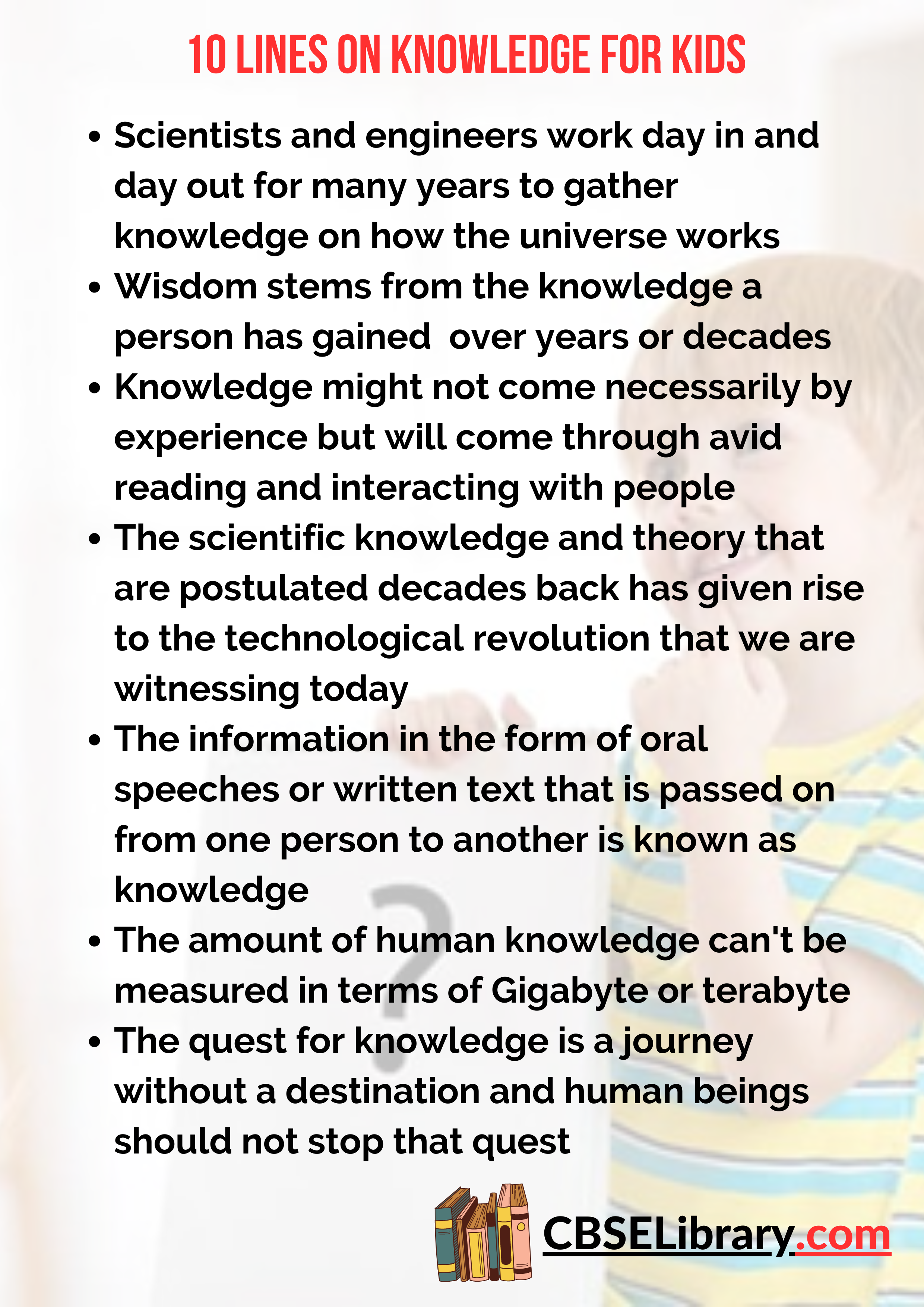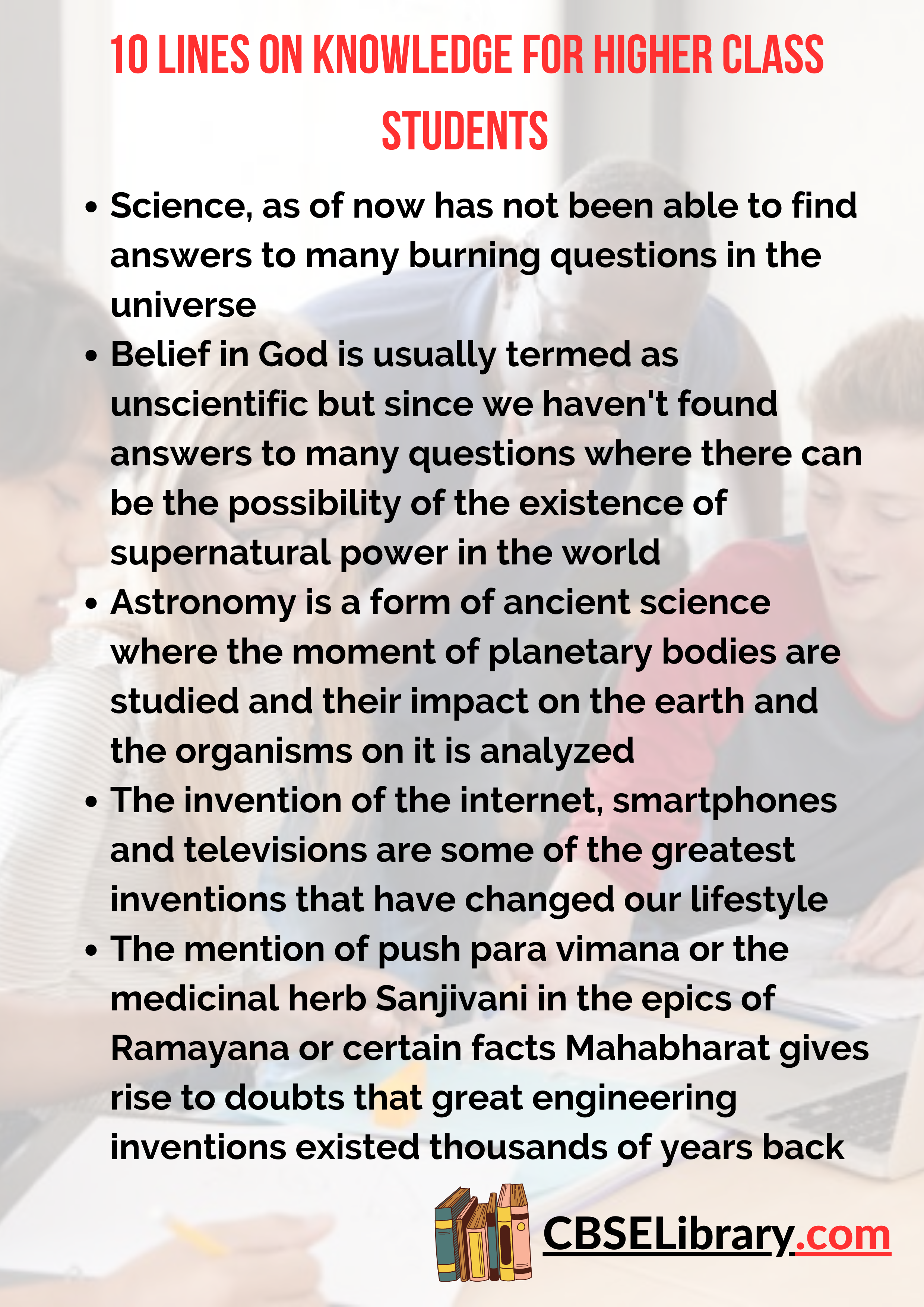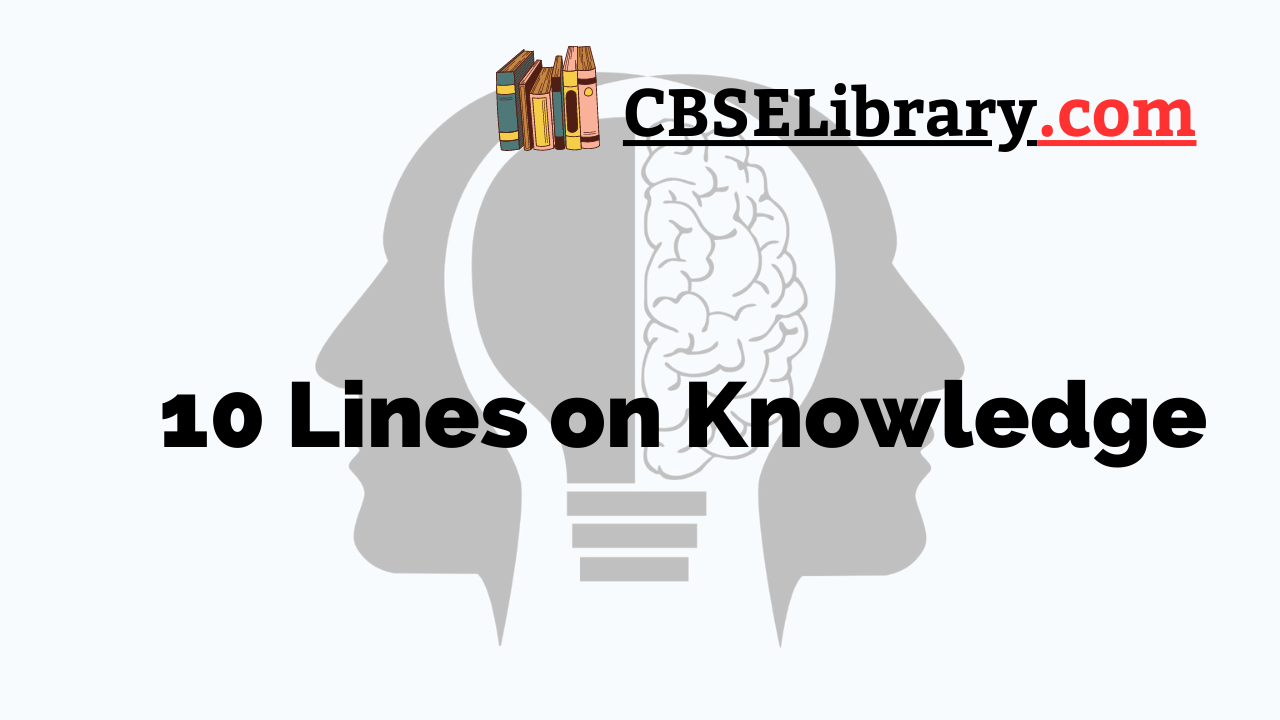10 Lines on Knowledge: The evolution and progress of human civilization from hundreds of years are purely due to the passing of knowledge from one generation to another generation. But we can’t deny the fact that the passing of knowledge can’t be in its purest form and at some point of time, knowledge is bound to fade out due to various reasons such as propaganda or fake news.
This is an era where we communicate on social media platforms such as Facebook, Instagram, Twitter on LinkedIn and as a result of which, it gives us a sense of acquiring knowledge but when we dig deeper, we come to know that most of the knowledge and content that we consume on digital platforms can be propaganda-driven, fake news and toxic in nature.
You can read more 10 Lines about articles, events, people, sports, technology many more.
Set 1 – 10 Lines on Knowledge for Kids
Set 1 is helpful for students of Classes 1, 2, 3, 4 and 5.
- The information in the form of oral speeches or written text that is passed on from one person to another is known as knowledge
- The amount of human knowledge can’t be measured in terms of Gigabyte or terabyte
- The quest for knowledge is a journey without a destination and human beings should not stop that quest
- Our knowledge on the working and the origin of the universe is very limited
- Scientists and engineers work day in and day out for many years to gather knowledge on how the universe works
- Wisdom stems from the knowledge a person has gained over years or decades
- Knowledge might not come necessarily by experience but will come through avid reading and interacting with people
- The scientific knowledge and theory that are postulated decades back has given rise to the technological revolution that we are witnessing today
- Even when we human beings think that we have enough knowledge on the working of the universe, nature keeps throwing new phenomenon at us as witnessed during the COVID-19 pandemic of 2020
- The day human beings stop their quest for knowledge is the day the progress of human civilization ceases.

Set 2 – 10 Lines on Knowledge for School Students
Set 2 is helpful for students of Classes 6, 7 and 8.
- Theory of relativity, Newton’s three laws of forces, quantum physics, cosmic theories, dark energy-matter and much more scientific knowledge has given rise to great inventions in the world
- The greatest is discovery for the economic progress was the invention of aircraft by Wright Brothers in the early 19th century
- The true value of knowledge lies in the fact in the way that knowledge has been distributed for the betterment of mankind
- Knowledge can be and will be used both for good and bad purposes
- The invention of nuclear fission and nuclear fusion led to to the creation of nuclear bombs which killed thousands of people during the Second World War
- But nuclear energy can also be used for good purposes such as powering villages and cities without polluting the environment and as an alternative for fossil fuels
- Knowledge is something that needs updating every now and then and the quest for knowledge is unlimited
- The knowledge that existed a thousand years back can be very different from the one that exists today
- Our quest for knowledge has given rise to the creation of medical miracles that has improved the average lifespan of human beings
- Knowledge has to be well documented and written so that it is passed on to next generation without out disturbances
Set 3 – 10 Lines on Knowledge for Higher Class Students
Set 3 is helpful for students of Classes 9, 10, 11, 12 and Competitive Exams.
- The mention of push para vimana or the medicinal herb Sanjivani in the epics of Ramayana or certain facts Mahabharat gives rise to doubts that great engineering inventions existed thousands of years back
- Even though there is no scientific backing for inventions in the mythological era, we can’t be sure of the fact that such inventions did not exist back then
- We, as an open-minded society, should not believe that anything beyond the scientific boundaries does not exist
- Science, as of now has not been able to find answers to many burning questions in the universe
- Belief in God is usually termed as unscientific but since we haven’t found answers to many questions where there can be the possibility of the existence of supernatural power in the world
- Billions of dollars are spent on improving our mental horizon and knowledge about the universe in the field of astrophysics
- Astronomy is a form of ancient science where the moment of planetary bodies are studied and their impact on the earth and the organisms on it is analyzed
- The invention of the internet, smartphones and televisions are some of the greatest inventions that have changed our lifestyle
- In the next decade, scientists and engineers predict that Artificial Intelligence and machine learning takes over our quest for knowledge and accelerate it to an unimaginable extent possible due to quantum computers
- The quest for knowledge is an exponential curve and it increases as more and more knowledge is acquired. It can be said without an ounce of doubt that it is the knowledge that has made human beings the most intelligent animal on the planet and we have to use that knowledge wisely and responsibly.

FAQ’s on 10 Lines on Knowledge in English
Question 1.
What is knowledge?
Answer:
Knowledge can be defined as information, facts or skills that one poses and intends to pass it on to another person
Question 2.
What is the importance of knowledge in our society?
Answer:
It is because of our accumulation of knowledge that we have been able to make economic, social, political and cultural progress in our society
Question 3.
What are the different types of knowledge?
Answer:
Declarative, somatic, contextual and procedural are the 4 different types of knowledge
Question 4.
What are the two types of knowledge documentation?
Answer:
The two types of knowledge documentation are tacit documentation and explicit documentation
